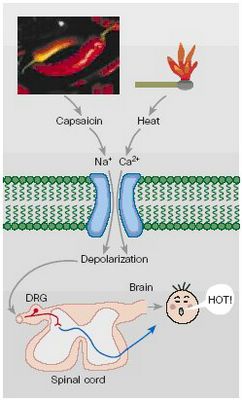Wednesday, May 18, 2005
Wednesday, May 11, 2005
Tuesday, May 10, 2005
Science: Spicy Food!
This sequence of petty disasters is repeated daily by hot-food novices eating at Malaysian, Mexican, Indian, Chinese, Indonesian and other restaurants serving cuisine from the tropical belt. Two questions come to mind.
Hot peppers and painful heat both activate sensory nerve fibres through an ion channel. The channel, known as vanilloid receptor subtype 1 (VR1), is activated by binding of capsaicin — the compound that makes chilli peppers hot. When activated, the channel opens, allowing an influx of calcium and sodium ions. The influx depolarizes neuronal pain fibres, initiating a nerve impulse through the dorsal root ganglion (DRG) to the brain. Noxious temperature uses the same elements, explaining why our mouths feel hot when we eat chilli peppers.
Interestingly, capsaicin is lipophilic and might bind the channel from either the exterior or interior of the cell. Its affinity for fat also explains why drinking more water after a spicy mouthful spreads the fire around, whereas absorbing the spice with food is more effective."
Monday, May 09, 2005
“Joey” 2nd season confirmed
After winning the “People's Choice Award” for “Favorite New Comedy” and “Favorite Male Television Star”, NBC has announced that they are renewing “Joey” (the spin off show of “Friends”) for another year.
http://tv.zap2it.com/tveditorial/tve_main/1,1002,271941861,00.html
Movie Review: Robots
Despite some cool ideas, like the “transportation system in Robot City”, the “birth of baby robots” and the attention to the detail in this fictitious world, I feel that this movie hasn’t brought anything new or different from the others we’ve been watching lately (Shrek, Finding Nemo, Ice Age, The Incredibles , etc). I think this was the biggest problem with “Robots”, all these cartoon movies have been so great that if you are just going to use the formula “more of the same” it won’t work, even if it has Robin Williams, Hale Berry or Mel Brooks.
Note: 6.2/10
Imdb: http://www.imdb.com/title/tt0358082/
Sunday, May 08, 2005
The new era of FOOD
1. Snail porridge.
2. Salmon poached with licorice jelly.
3. Smoked bacon and egg ice cream.
Are you disgusted already? Well, don’t be because this is part of the menu of “The Fat Duck” recently considered to be the best restaurant in the world (according to restaurant magazine).
The chef, Heston Blumenthal that started out to be a photo-copier salesman 10 years ago, is now at the age of 39, one of the youngest chefs in history to receive 3 Michelin stars.
Blumenthal is also one of the leading lights of MOLECULAR GASTRONOMY, an emerging school of cooking that emphasizes the science of cuisine (like understanding why meat is best slow cooked at 58°C since higher temperatures cause the proteins to tighten and to release their juices into the pan).
Collaboration with a vast circle of chemists and physicists exposed him to common lab-equipment and his friendship with a vice-president of Firmenich (a Swiss fragrance and flavor company) made him discover the existence of thousands of flavored molecules and extracts isolated in little jars.
By sampling molecules and learning the chemical connections between them, Blumenthal started to create its famous “flavor pairings”: white chocolate and caviar, foie gras and jasmine, asparagus and licorice all have molecular commonalities that keep their flavors from clashing; in fact they may sometimes lead to electric new flavors.
So if you happen to be in the neighborhood just give it a try.
The restaurant: www.fatduck.co.uk/
To read the full article on Heston Blumenthal check "Time magazine" (May 2, 2005)
If you are interested in knowing more about molecular gastronomy: Webpage of “Hervé This” (French leasing scientist): www.college-de-france.fr/chaires/chaire10/page_herve/PageHerve.htm
"The late Nicholas Kurti, a physicist in an elite field called molecular gastronomy, argued that the best way to cook a perfect three-minute egg is to cook it for one hour at 60°C." [Toronto Star, 7 Apr. 2004]
Friday, May 06, 2005
Movie Review: Kingdom of Heaven
From today onwards, I’m going to share my comments about the movies I watch. In the end, every movie will be scored 1 to 10(10 being the best).
Today I watched “Kingdom of Heaven”.
Not a bad movie if you are trying to occupy yourself on a rainy holiday.
This movie touches the hard subject of religion, and the way religions interact with one another. The concept of coexistence of all religions is kindda cool, and how I wish that could be the way…
The movie is packed with action scenes where Muslims and Christians fight over the control of Jerusalem in the XII century. There is also the usual love story between the hero and the princess. Throughout the movie we are introduced to some great characters like the leprous king, the father-baron and of course Saladin the charismatic leader of the Saracens.
Despite some inconsistencies along the plot the movie is not too bad all together.
Note: 7/10
IMDB: http://www.imdb.com/title/tt0320661/
Thursday, May 05, 2005
The itchi-Samurai is born
What is it about?
Well, you'll just have to stick around and we promise we are going to speak about whatever we feel like, whenever we feel like it.
We promise to be FUNNY every once and a while, and be NONSENSE most of the times.














